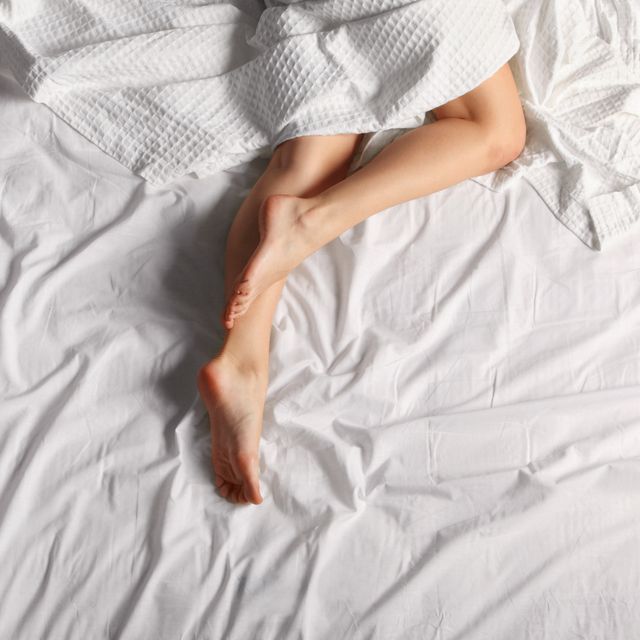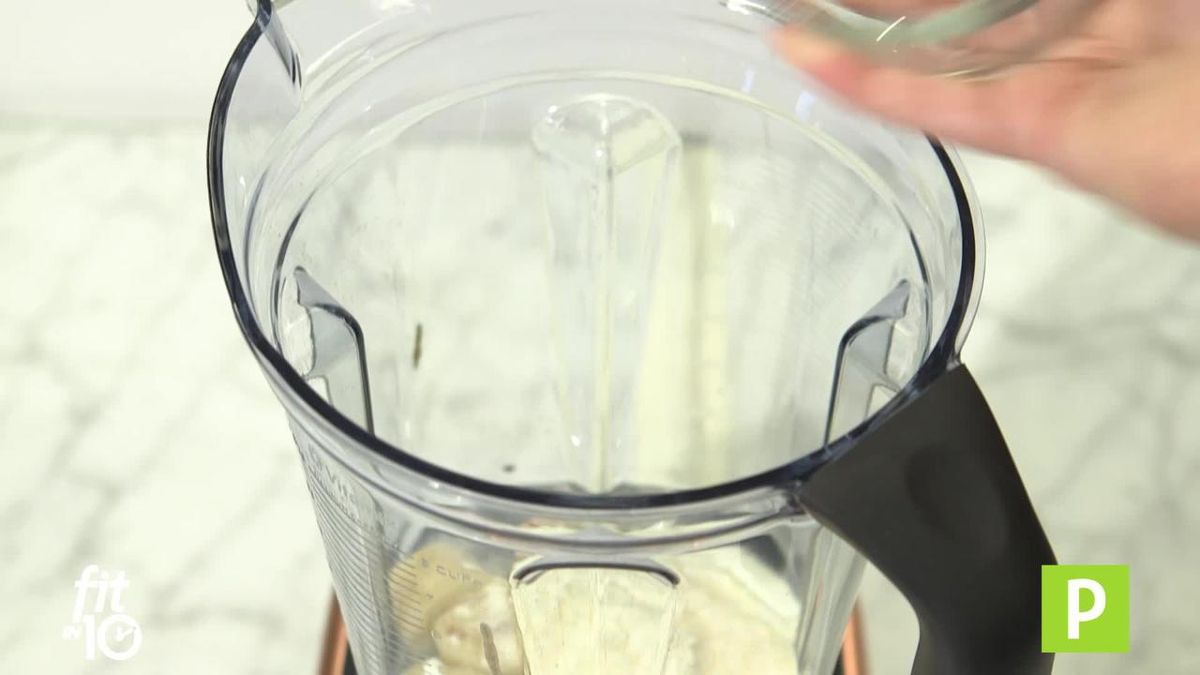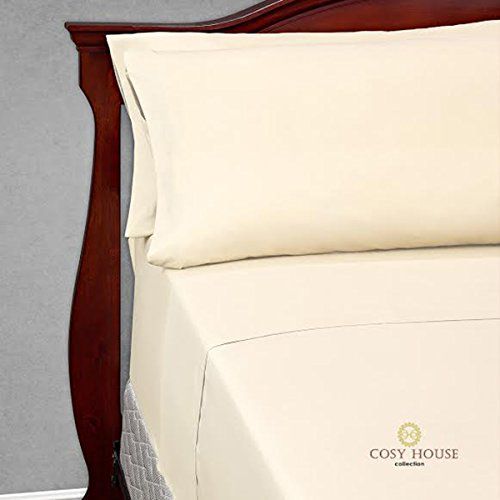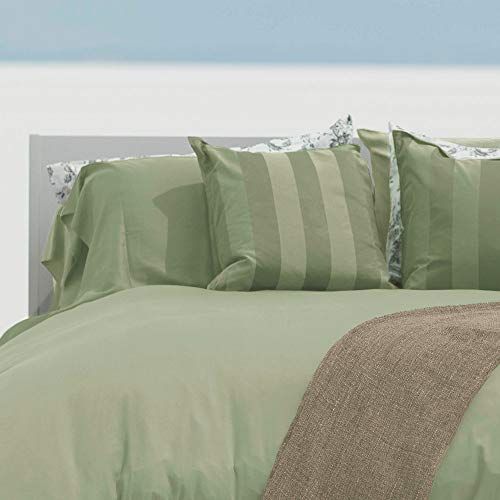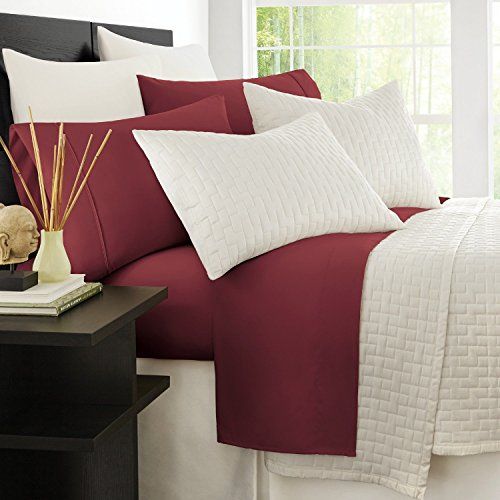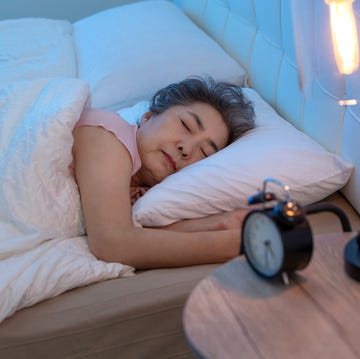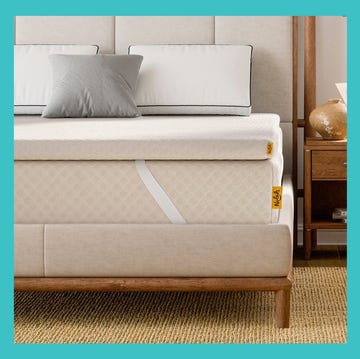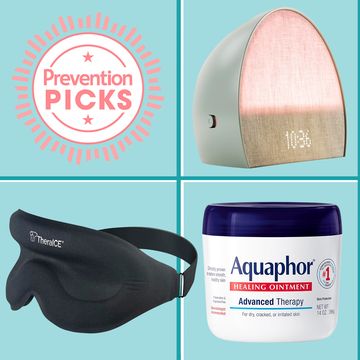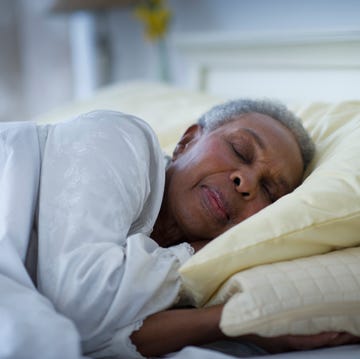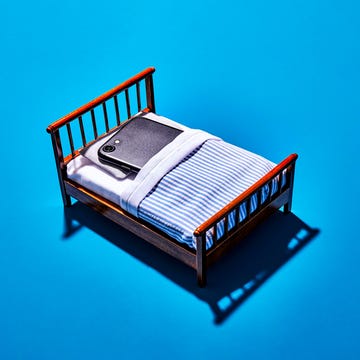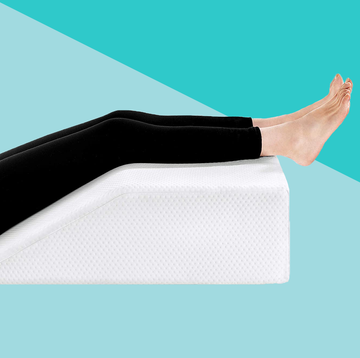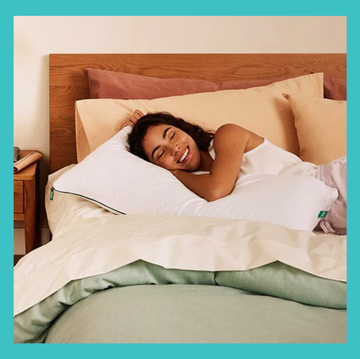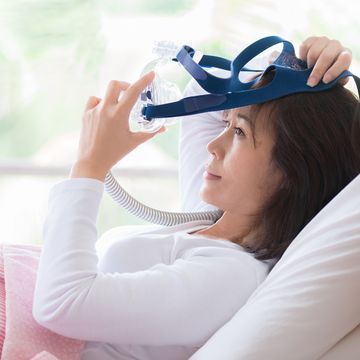Good news for hot sleepers, snoozing commando can help you get quality zzz's, improve your relationship and much more. If you already go to bed naked, you're not alone. According to a 2018 Mattress Advisor poll that surveyed more than 1,000 people, nearly 60 percent of men sleep naked and women 56 percent. Participants of the study said they feel more comfortable sleeping in the buff. It's likely because the ideal temperature for sleep is between 60 and 67 degrees Fahrenheit, the National Sleep Foundation reports. So if you sleep with pjs under the covers, it's easier to overheat and wake up in the middle of the night. That said, here are more surprising reasons sleeping naked can help you reach REM and benefit your health.
🛏️ It can benefit your relationship
The science behind this is likely related to the benefits of skin-on-skin contact, which has been found to trigger the release of oxytocin, the bonding hormone. "The thought being that oxytocin is the neurotransmitter that facilitates 'social synchrony.' Studies imply that when couples are close via touch, sleep, or sex, they synchronize in many ways," W. Christopher Winter, MD, author of The Sleep Solution: Why Your Sleep Is Broke and How to Fix It, explains. Dr. Winter believes that this is the reason many young couples who can't keep their hands off of each other seem to sleep better together, while older couples who are less intimate with each other struggle to co-sleep.
🛏️ It can help you sleep deeper
Body temperature has a lot to do with the quality of your sleep. "Sleeping naked or with very little clothing allows your body temperature to lower. Your body temperature can fluctuate significantly over the course of a night, but sleeping naked allows it to be regulated more easily," says Dr. Winter.
As we mentioned earlier, it's best to sleep in a room with a temperature between 60 and 67 degrees Fahrenheit. The reason is that your body temperature naturally drops before you fall asleep, so keeping your room cool helps initiate the nighttime shutdown...and helps you stay asleep.
“The body temperature drop is probably related to an evolutionary mechanism of energy conservation. This [sleeping naked] is a way to do it,” says Dr. Winter. "Optimizing temperature can lead to a more rapid sleep onset, less awakenings, and potentially more time spent in deeper stages of sleep."
🛏️ It can help you lose weight
Sleeping naked could help keep your body cool during the night, which may help your body increase stores of brown fat. Unlike white fat, brown fat burns energy to create heat and help maintain body temperature. This can help your metabolism increase, according to a 2014 National Institute of Health (NIH) study. Researchers observed five healthy men who slept in a room set to 66 degrees Fahrenheit. After a month, researchers found that the participants had a 42 percent increase in brown fat. The cold temperatures also improved their insulin sensitivity, which brings us to our next point.
Need a night cap? Skip the glass of wine and prepare this snooze-inducing banana smoothie instead. Sweet dreams!
🛏️ It could help regulate insulin levels
Studies have suggested that exposure to cold temperatures has an impact on leptin and adiponectin—the hormones that help balance insulin. Leptin helps regulate appetite while adiponectin plays a role in glucose metabolism and fatty acid breakdown, Dr. Winter explains. Sleeping naked exposes you to more cold air, therefore, keeping your insulin-regulating hormones in check.
According to the 2014 NIH study, participants' glucose metabolism improved after sleeping in colder temperatures for a month. “Leptin and adiponectin are produced by adipose (fat) cells. The secretion of both of these chemicals is impaired by sleep deprivation, so sleeping in a hot environment, which is known to disrupt sleep, could impair the secretion and function of these two transmitters,” says Dr. Winter.
🛏️ It will help your skin stay clear
“In general, sleeping naked will help allow your skin to breathe. Tighter clothing can lead to friction and irritation that can put skin at risk of developing clogged pores and rashes,” says Michael Kassardjian, DO, a board-certified dermatologist at Coast Dermatology. Moreover, overheating—caused by warmer clothing—is the perfect breeding ground for bacterial and fungal infections to occur and proliferate.
“Jock itch, folliculitis, acne and yeast infections are some examples of what can then develop,” says Dr. Kassardjian.
Remember: Good bed hygiene is a must
Now that you know the potential benefits of sleeping naked, you can take a step farther in improving your sleep by adopting healthy bed habits. While there isn't a clear-cut rule on how often you should wash your sheets, the National Sleep Foundation recommends changing your sheets once a week. Sticking to the same sheets longer can lead to acne breakouts, allergy symptoms, and even fungal infections. Be sure to replace mattresses every 10 years and pillows every 18 months. If you suffer from allergies, consider using dust-proof pillow cases to prevent dust mites and mold, or wash your pillow cases in hot water once a week. Stick to sheets with anywhere between a 200 to 400 thread count, the National Sleep Foundation advises. Anything more than that might make you too warm and disrupt sleep.
On the market for new sheets? Check out these breathable, hypoallergenic bed sheets that'll prevent you from overheating.
Emily Shiffer has worked as a writer for over 10 years, covering everything from health and wellness to entertainment and celebrities. She previously was on staff at SUCCESS, Men's Health, and Prevention magazines. Her freelance writing has been featured in Women's Health, Runner's World, PEOPLE, and more. Emily is a graduate of Northwestern University, where she majored in magazine journalism at the Medill School of Journalism and minored in musicology. Currently residing in Charleston, South Carolina, Emily enjoys instructing barre, surfing, and long walks on the beach with her miniature Dachshund, Gertrude.
